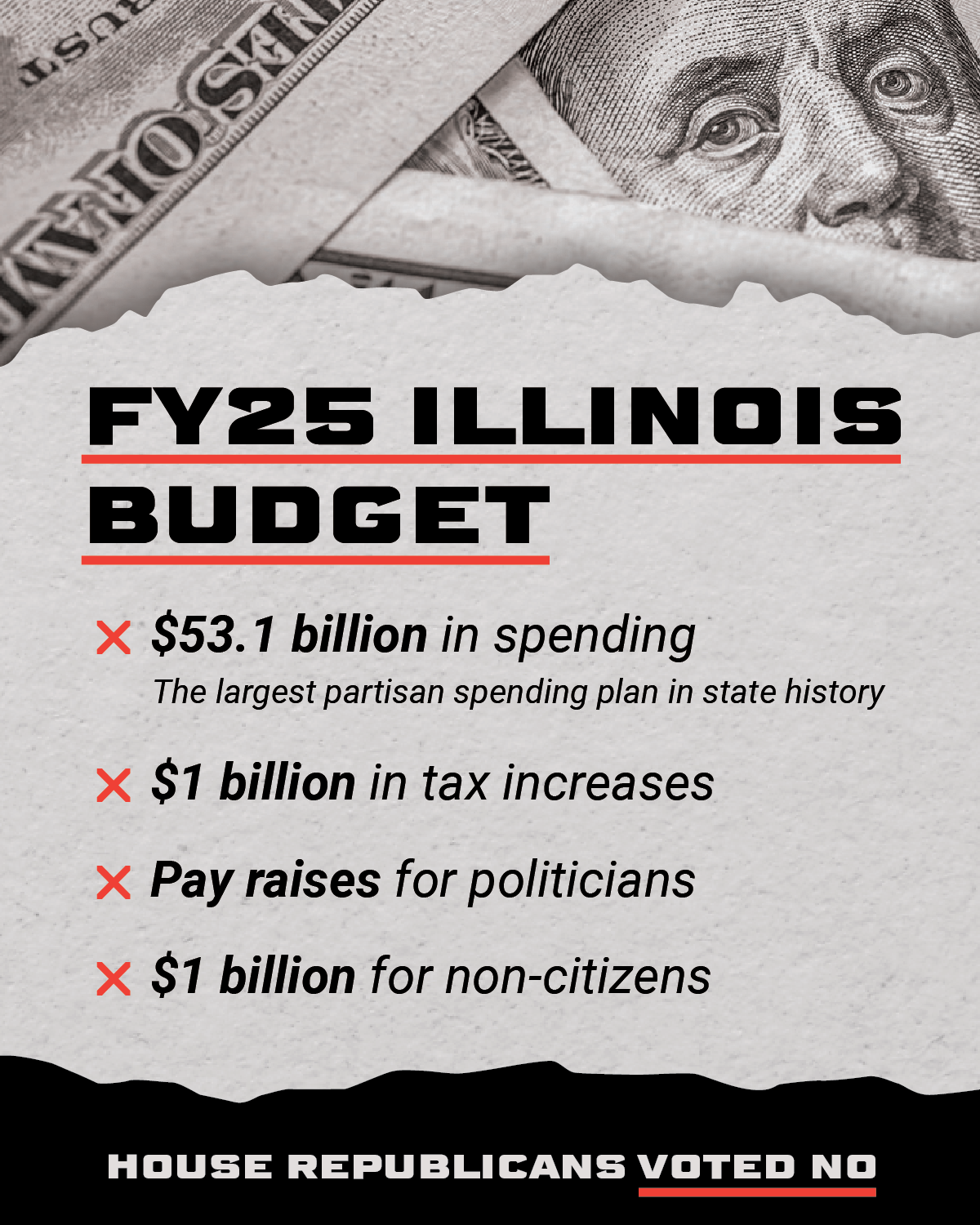In this issue:
- Largest spending bill in Illinois history signed into law
- Judge blocks Democrats’ election law changes
- Bill passes to grow jobs, protect taxpayer investment
- Visit to Incobrasa
Largest spending bill in Illinois history signed into law
The Governor has signed the massive $53.1 billion spending bill into law, setting a new record for spending money by state government in Illinois. This year’s budget is $2.6 billion bigger than last year’s and required taxes to be raised by $1 billion in order to come up with enough money. Back in 2020 the state budget was “only” $40 billion.
The budget, which takes effect with the start of the new state fiscal year on July 1, includes $1 billion for non-citizens and funds for another pay raise for politicians. Every Republican (and even some Democrats) voted No.
Bills which I and other representatives sponsored this year to lower the tax burden on Illinoisans did not even get called for a hearing, much less a vote. It seemed like the majority was determined from day one to jam through more taxes and more spending. One thing that stood out to me was their unwillingness to pass estate tax relief for farmers and small businesses in Illinois, while enacting tax breaks for Hollywood movie producers.
There are important priorities and worthwhile projects that deserve funding. But we have to be responsible about spending taxpayer money. We cannot keep coming back to the taxpayers every year demanding more and more.
Judge blocks Democrats’ election law changes
Last month I told you about a hastily-passed bill which made changes to Illinois’ election law. It went from introduction to enactment in about 48 hours. The law was a partisan power grab that changed Illinois election law to block citizen referendums and made it harder for candidates to get on the ballot.
A lawsuit was quickly filed, and a few days ago a Sangamon County judge ruled that it was unconstitutional to change ballot-access laws in the middle of an election year.
“The General Assembly could make the revisions effective for the next election, rather than in the midst of the current election,” wrote Judge Gail Noll in her opinion.
The ruling does not strike down the law altogether, it just prevents it from going into effect for this year’s election cycle.
Bill passes to grow jobs, protect taxpayer investment
Even though the biggest bill of the spring session was a disappointment, there was also a healthy portion of good news from the Capitol. One of these good bills which passed was Senate Bill, a bill I co-sponsored to create a Job Training and Workforce Development Transparency Act.
One of the best ways we can attract employers to Illinois to create jobs is to show them that we have a qualified and highly-trained workforce. A key way to achieve that goal is by investing in employee development and training. SB 2907 helps ensure that the state’s investment in workforce training programs is producing the results we need. The legislation will require the Department of Commerce and Economic Opportunity to work with state agencies to review the effectiveness of the state’s workforce development programs and report its findings to the General Assembly.
The goal is to identify areas where we can make our training programs more effective, while also providing greater transparency so we know our tax dollars are being well spent.
Our bill passed both houses in May, and is now on its way to the Governor’s desk.
Visit to Incobrasa

My staff and I toured Incobrasa in Gilman on Wednesday. I have hauled thousands of bushels there for the farm over the last 15-20 years but had not had the full tour until this week.
Incobrasa is a soybean processing and biodiesel manufacturing company with roots in the industry going back over 50 years. About 95% of the biodiesel produced at Incobrasa stays right here in Illinois.
They are currently working on an expansion that represents more than a $250 million capital investment and will create 40 new full-time jobs while retaining 200 jobs – generating economic benefit for the region and state. They will more than double their production capacity by 2030.
Pictured with me is Incobrasa’s Plant Manager Sergio Baruffi.
Our current bill backlog
When a vendor provides the state with goods and services, they submit the bill to the Illinois Comptroller for payment. The Comptroller processes the paperwork and pays the bill when funds are available in the state’s checking account. Currently the total amount of unpaid bills is $1,022,984,902. This figure changes daily. Last year at this time the state had $991 million in bills awaiting payment. This only includes bills submitted to the Comptroller for payment, not unfunded debts like the state’s pension liability, which is well over $100 billion.
Illinois headlines
Illinois Housing Development Authority warning residents of online scam
Former DCFS worker handling AJ Freund care sentenced to 6 months in jail
Dairy Farmers Donate 17,424 Pounds of Milk to Illinois Food Banks
Illinois Manufacturing Hall of Fame announces its first class of inductees
Illinois State Museum seeks Route 66 memories for 100th anniversary celebration
